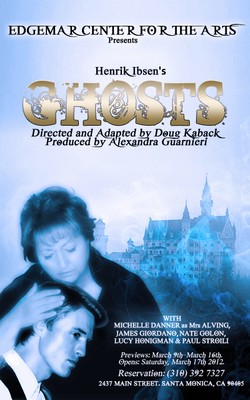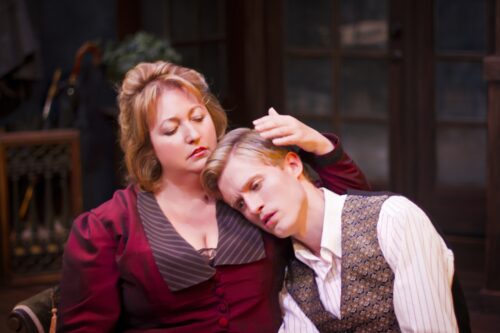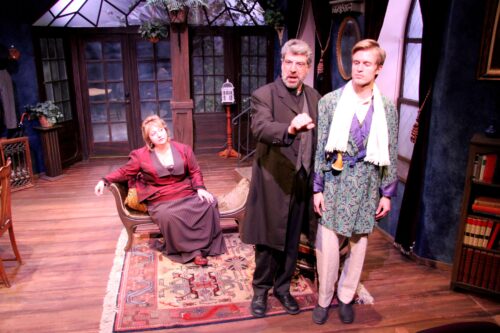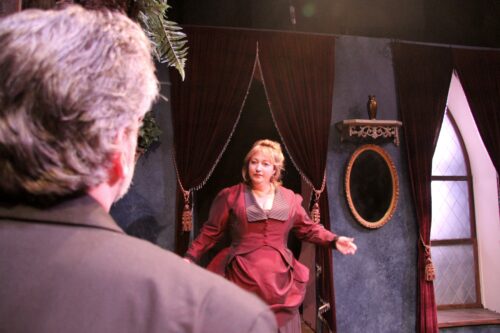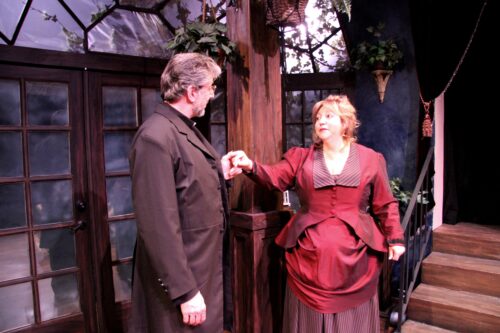GHOST WRITTEN
Henrik Ibsen wrote at a watershed moment in theater history, at the decline of melodrama and the rise of naturalism; some of his best plays reflect a tension between these poles. Doug Kaback’s new adaptation of Ghosts shines a harsh light on the play’s least synthesized moments, since the director has cut much of the dialogue that buffers the outrageous elements. With an incestuous flirtation in the kitchen and an uninsured orphanage ablaze outside the parlor window, a second-weekend audience guffawed when Mr Kaback used shrill violins to push the moment not only over the top but also down to the bottom. One theatergoer was heard to comment, “Ibsen didn’t write musicals.”
In fact, the lady was partly misinformed. True, Ibsen is not noted for his embrace of the showstopper kickline, but during the late nineteenth century when this play premiered (incidentally, not in Europe but in Chicago), house orchestras routinely enhanced the mood of straight plays. Mr Kaback’s nod to the play’s stylistic origins, however, is an odd choice, given his lack of interest in the original text.
Mrs Alving (Michelle Danner), a widow attempting to overcome her debauched husband’s legacy through good works, spars with her business adviser, Pastor Manders (Paul Stroili) about questions of morality and prudence, even as a drunken workman on her estate, Engstrand (James Giordano), persuades his ambitious daughter Regina (Lucy Honigman) to abandon her work with Mrs Alving and come home with him. Mrs Alving’s agendas for all these people are upset by a series of tragic acts and accidents, and by her mysteriously afflicted son Osvald (Nate Golon). That’s a lot of story. It takes some time and care to spin all those plot threads into a dramatic fabric, but Mr Kaback has trimmed three acts into two and thereby removed the context for the sometimes histrionic points of catharsis; imagine Oedipus, heralded by no chorus, walking onstage to say “Oh, mom!” and promptly claw out his eyes. Instead of understanding the full horror of the situation, one would wonder why. And so it is in this production, where actor and audience are thrust into difficult scenes without the momentum afforded by the intact play.
It takes a talented director to make a production of Ibsen accessible to a post-millennial crowd, and in attempting to streamline a talky piece, Mr Kaback has made his already demanding task nearly impossible. Since Ibsen wrote primarily about hypocrisy, his characters talk circuitously, the circles spinning ever smaller until finally someone screams, usually a woman. This play was not written to showcase moments of hysteria but, through dramatized, passionate debate, to advance revolutionary ideas: the emancipation of women; the dangers of sexual repression; the duplicity of revered institutions. These were Ibsen’s causes, and to chop his play by a third is to excise much of what inspired that work, and to hamstring what is of value in it.
Mr Kaback has another handicap in this production, and that is the presence of the Artistic Director of the Edgemar Center for the Arts, Michelle Danner, in the lead role. While crafted beats and moments are rare in this production, many of the actors do their best to provide them. Ms Honigman and Mr Stroili are excellent in their early scene together, creating a chemistry and drive appropriate to the script; Mr Giordino and Mr Golon wink and indicate their way through, trying harder than an attentive director would have allowed them to think necessary. All these actors try to supply elements necessary to the play. Ms Danner displays no similar instinct; nor, unfortunately, does Mr Kaback.
photos by Seony Keo
Ghosts
Edgemar Center for the Arts in Santa Monica
ends on May 13, 2012
for tickets, visit Edgemar
